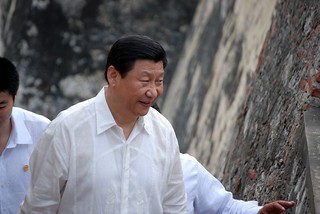Here are a collection of quotes which defend Post-Stalin U.S.S.R.
Part 6 of This Series:
– Reading List On Post-Stalin U.S.S.R.:
– Video Series On Post-Stalin U.S.S.R.:
Khrushchev Quotes:
“I started working as soon as I learned how to walk. Until the age of fifteen, I worked as a shepherd. I tended, as the foreigners say when they use the Russian language, ‘the little cows,’ I was a sheepherder, I herded cows for a capitalist, and that was before I was fifteen. After that, I worked at a factory for a German, and I worked in a French-owned mine, I worked at a Belgian-owned chemical factory, and [now] I’m the Prime Minister of the great Soviet state. And I am in no way ashamed of my past because all work is worthy of respect. Work as such cannot be dirty, it is only conscience that can be” - N.S. Khrushchev
"The power of our society and state in connection with the transformation of the dictatorship of the proletariat into a national state is not only not weakening, but, on the contrary, is increasing many times, because new sources of our power are being added to the former sources of our strength. Along with the constant increase in economic potential, the social base of our state has strengthened and expanded, the society has become unified and monolithic as never before. And this is the main source of the state’s strength. Every worker, every peasant, every intellectual can say: the state is we, his policy is our policy, the task is to develop and strengthen him, to protect him from all encroachments - this is our common task. (Prolonged applause). And why, in fact, is the state itself preserved, although the main thing that gave rise to it, class antagonism, has disappeared? This is explained by the fact that the tasks that society can solve only with the help of the state have not yet been exhausted. These tasks and functions of the socialist state are clearly defined in the draft Program of our party. - N.S. Khrushchev
“Our State, which arose as a state of the dictatorship of the proletariat, developed at a new, modern stage into a state of the whole people, an organ of expression of the interests and will of the whole people. Insofar as the working class is the most advanced, organised force of the Soviet society, it exercises its leading role even during the period of extensive Communist construction. The working class will complete its role as leader of society with the construction of Communism when the classes disappear” - N.S. Khrushchev
“The dictatorship of the proletariat born of the socialist revolution played a world-historic role in securing the victory of socialism in the U.S.S.R. At the same time, in the process of building socialism she herself has undergone changes. In connection with the liquidation of the exploiting classes, the function of suppressing their resistance has died out” - N.S. Khrushchev
“Naturally, when socialism won in our country completely and finally, and we entered the period of the expanded the building of Communism, the conditions that caused the need for a dictatorship of the proletariat, its internal tasks were done” - N.S. Khrushchev
“I would like to focus on some of the fundamental issues of modern international development that determine not only the course of current events, but also future prospects. These are questions about the peaceful coexistence of the two systems, about the possibility of preventing wars in the modern era and about the forms of transition of various countries to socialism” - N.S. Khrushchev
“When we talk about the fact that in the competition of two systems - capitalist and socialist - will win the socialist system, this does not at all mean that victory will be achieved through the armed intervention of the socialist countries in internal affairs of the capitalist countries” - N.S. Khrushchev
“The stated provisions of the Marxist-Leninist theory are they also overturn the notorious formulation of the question of “ex-port of the revolution ”. It is Marxism, in contrast to all bourgeois ideological concepts, proved that revolutions occur do not occur by order, not because of the desires of individuals, but due to the natural course of the historical process. “Of course,” Lenin pointed out, “there are people who think that a revolution can be born in a foreign country by order, by co-announcement. These people are either madmen or provocateurs… We know that they cannot be made either by order or by agreement that they grow when tens of millions of people come to the conclusion that it is impossible to live like this any longer” - N.S. Khrushchev
“In this fight against the skeptics and capitulators, the Trotskyites, Zinovievites, Bukharinites and Kamenevites, there was definitely welded together, after Lenin’s death, that leading core of the Party… that upheld the great banner of Lenin, rallied the Party behind Lenin’s behests, and brought the Soviet people onto the broad paths of industrialising the country and collectivising the rural economy. The leader of this core and the guiding force of the Party and the state was Comrade Stalin” - N.S. Khrushchev
“Three weeks later (After the Secret Speech), before eight hundred guests at a Chinese Embassy reception, he declared that being a Communist was ‘inseparable from being a Stalinist,’ so that even though ‘mistakes’ had been made in the struggle against the enemies of Marxism-Leninism, ‘may God grant that every Communist will be able to fight for the interests of the working class as Stalin fought.’ Communism’s enemies had tried to exploit his criticism of Stalin’s shortcomings to undermine the Soviet regime. But ‘nothing will come of this, gentlemen, any more than you will be able to see your ears without a mirror’”


– Quotes -1 -2 -3